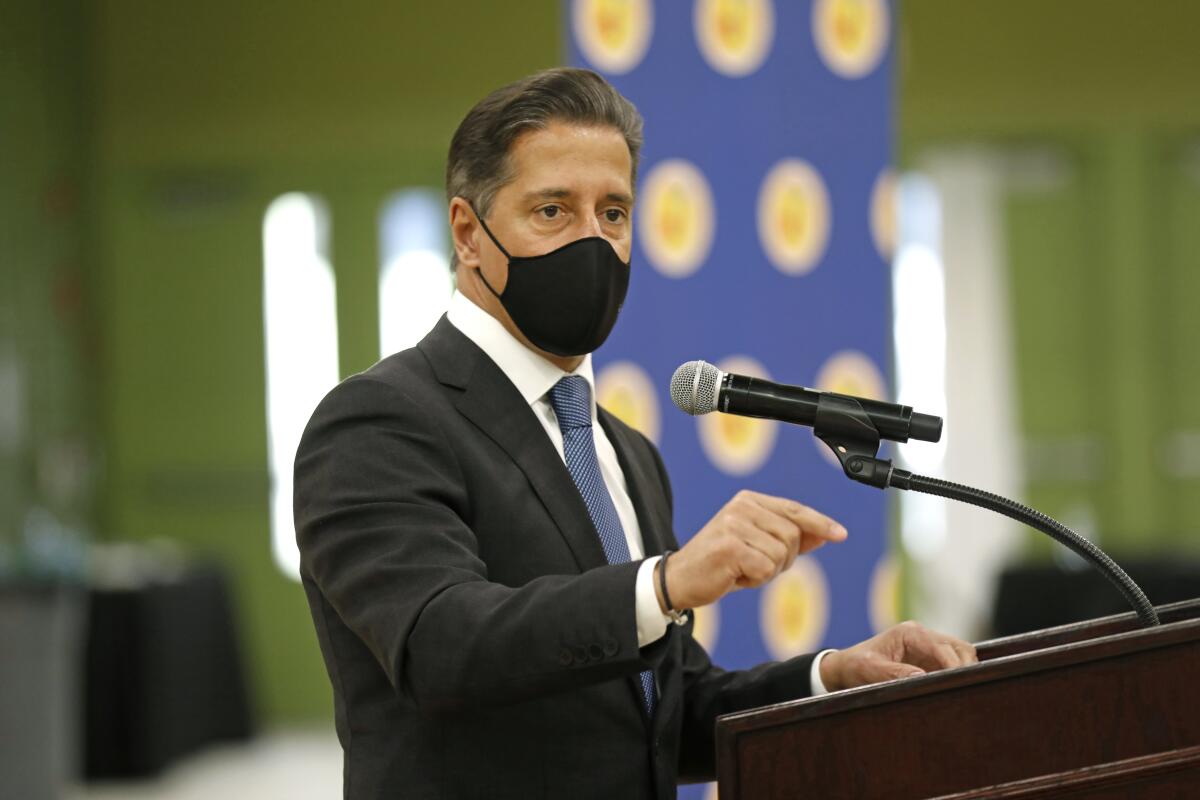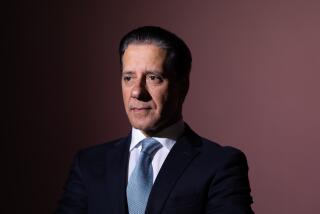New LAUSD Supt. Alberto Carvalho: ‘We have to emerge from this crisis stronger’

Alberto Carvalho, the new Los Angeles schools superintendent, promised on Tuesday to bring energy, passion and compassion to his new role as head of the nation’s second-largest school system, shortly after the school board Tuesday approved his four-year contract with an annual $440,000 salary.
Carvalho, 57, accepted his new job after 13 years leading Miami-Dade County Public Schools, the nation’s fourth-largest K-12 district. The board made its decision last week while Carvalho was in Miami. He immediately said his farewells on the East Coast.
Tuesday marked his first public appearance in Los Angeles as the new schools chief, where he pledged to help students recover from the trauma of the COVID-19 pandemic.
“Honestly, I’m excited about this opportunity,” Carvalho said after the board’s 7-0 vote. “And my excitement is a reflection not only of the opportunity Los Angeles offers to all of us, but also reciprocally and with equal weight, the responsibility we have to emerge from this crisis stronger than we entered it.”
He also spoke of eliminating long-standing achievement gaps that separate the more privileged from the less privileged, with attention to immigrants, English learners and students with disabilities. He said the work must be approached “in a very forceful, respectful, compassionate way” that would “recognize the needs of our students, their parents, the families and certainly our workforce.”
Carvalho delivered his remarks again in Spanish. He will take the helm in March — or sooner if he is able to do so.
His compensation is the most ever offered to an L.A. superintendent. His predecessor, Austin Beutner, received $350,000 annually for a three-year term, which he completed at the end of June. In addition, Carvalho will benefit from a $50,000 annual contribution to a retirement plan and a relocation allowance of $50,000. His contract will make him among the nation’s highest-paid superintendents.
Board member Jackie Goldberg called his job the toughest in the country.
The district also will pay for life insurance and provide 24 vacation days per year, which can be cashed out if not used.
After accepting the job in the board’s meeting room — which continues to be closed to the public as a COVID-19 safety measure — board members and Carvalho dispatched to the cavernous gym at the adjacent Roybal Learning Center, where the new leader took questions from the media.
One idea he wants to bring from Miami is a Parent Academy, an effort spearheaded by Carvalho under Rudy Crew, his predecessor as superintendent in Miami. Carvalho said he envisions “the nation’s largest Parent Academy,” funded with philanthropic and business support “at no cost to the taxpayer.”
The goal would be to help parents learn how to “navigate the system on behalf of their children” and to enhance their civic knowledge and workforce skills.
Carvalho maneuvered carefully past questions that could raise concern among various groups.
When asked, for example, about pay-for-performance — which can link teacher compensation to student test scores — Carvalho said he did not embrace the idea but complied in Miami only to the extent required by law in Florida, which has more conservative politics than California.
He also fielded a question on school choice — which, at one extreme, refers to families being able to use public-school funding for tuition at private or religion-based schools. He spoke of providing robust choice to families within the traditional public school system and suggested that L.A. Unified already was pursuing that goal.
When asked about declining enrollment — which threatens funding sources and the viability of neighborhood schools — he said he would focus on bringing in more students through preschool programs, providing parents with desirable choices and marketing L.A. Unified as a compelling option.
Carvalho introduced himself to Los Angeles with elements of his personal story, speaking about a childhood in Portugal, where he lived with his parents and siblings in a one-room apartment with no running water and no electricity. His father worked as a janitor; his mother, a seamstress.
Like a new Angeleno, Carvalho also talked traffic and weather, noting his immediate introduction to clogged highways and his unexpected meet-up with weather so stormy that it seemed to be raining “sideways.” He joked that he heard someone refer to the storm as “Hurricane Alberto.”
His 24-hour stay in L.A. was something of a whirlwind, also including meetings with administrators, parents and union leaders.
Carvalho is among the nation’s most experienced and admired school district leaders and brings to L.A. a reputation for stability and improved student achievement at a pivotal moment for L.A. Unified, which is undertaking a monumental pandemic recovery effort for its 450,000 students.
He will join a school system in which many students have long struggled to achieve and were further set back — academically and emotionally — by the COVID-19 pandemic. The district also is facing sharply declining enrollment and a long-term structural deficit. The financial risk has receded, for now, because of billions of dollars in coronavirus relief and state tax surpluses that Carvalho must spend quickly and wisely.
In Miami, Carvalho’s accomplishments included enhancing science and technology opportunities at schools and increasing the number of Advanced Placement and honors classes for minority students from low-income families. More broadly, Carvalho seized on the importance of offering choices in schooling that embodied variety, quality and academic rigor, his supporters said.
Last week, Miami-Dade school board member Lucia Baez-Geller praised Carvalho as data-driven, skilled at integrating technology and someone “willing to take steps that might not be popular but are necessary.”
On Florida’s accountability system, the Miami-Dade district’s rating has risen to an A, although some schools continue to struggle with persistent low achievement.
Since 2006, L.A. Unified has had eight school chiefs, including interim office holders. Beutner stepped down in June at the end of his three-year contract, in part citing exhaustion after managing through a teachers’ strike and a pandemic. Beutner’s top deputy, Megan Reilly, has served as interim leader since that time and was a finalist for the job.
Reilly presided over the open session of the 9 a.m. meeting, during which Kelly Gonez was reelected to a second consecutive one-year term as president of the seven-member Board of Education.
Carvalho said his goals for the future aligned closely with those of the board. When asked, he expressed full support for the Board of Education’s response to the COVID-19 pandemic.
“I’m mindful of policies adopted by this board,” said Carvalho, who taught math and science for four years before moving to the administrative track. “They are based on science. They are based on proven elements that are protective of school communities.”
District safety measures have included requiring students to wear masks outdoors as well as indoors — which the state also requires. Carvalho specifically defended the district’s decision to mandate vaccines for all employees and for students 12 and older — as well as Tuesday’s decision to push back the deadline for enforcing the student mandate from Jan. 10 to next fall.
The new schools chief said he was prepared to think big, but with one crucial caveat: the need for full and broad buy-in.
“I can promise you we can guarantee steady improvement — in some cases, significant improvement over short periods of time,” he said “But only if the entire community comes together to realize these strategic opportunities.”
Monica Garcia, the longest-serving board member, echoed that theme in her remarks.
“I need you to help him,” Garcia said to everyone listening. “I plead with you to support him as he takes on this work.”
More to Read
Sign up for Essential California
The most important California stories and recommendations in your inbox every morning.
You may occasionally receive promotional content from the Los Angeles Times.











